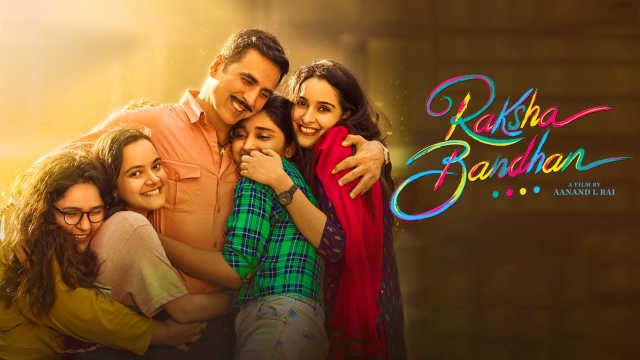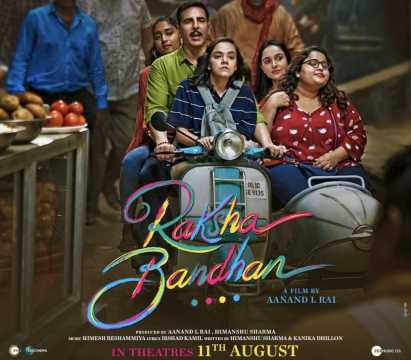
Sonal Pandya
Mumbai, 11 Aug 2022 16:00 IST
The Aanand L Rai film, starring Akshay Kumar, delves into problematic stereotypes and clichés while trying to tell the story of a man caring for his four sisters.

The holiday release, Raksha Bandhan (2022), feels more like an episode of a daily soap than a feature film. Directed by Aanand L Rai, the Hindi film features Akshay Kumar as Lala Kedarnath, the harried older brother of four younger sisters, Gayatri (Sadia Khateeb), Laxmi (Smrithi Srikanth), Durga (Deepika Khanna), and Saraswati (Sahajmeen Kaur).
The screenplay, by Himanshu Sharma and Kanika Dhillon, paints all of these characters with broad strokes. Lala is the self-sacrificing eldest sibling who has promised his mother on her deathbed that he will not marry before each one of his sisters is wed. He also takes charge of the family chaat shop in Delhi’s Chandni Chowk, which promises that pregnant women who eat their famous gol gappe will have a son.
Meanwhile, his sisters are a study in contrasts. Laxmi is mocked for her dark skin, Durga for being plus-sized, and Saraswati for being a tomboy. Of course, Lala’s favourite is the fair-skinned Gayatri, who is perfect is his eyes. He worries more about the unruly trio instead, even as he is protective of anyone who lays an eye on them.
Lala also has his much younger childhood sweetheart Sapna (Bhumi Pednekar) waiting in the wings. She grows tired of his promises and Sapna’s father gives him a few months to get his sisters married before he finalizes Sapna’s wedding.

The main barrier to Lala completing his promise is dowry. Each possible suitor has a long list of financial demands that they expect to be met with marriage. As the dutiful brother, Lala runs himself ragged trying to fulfil this, before realizing too late the societal evils of dowry.
The film, which tries to explain the wrongs of the dowry system, delves into problematic stereotypes in telling a regressive story. In one scene, a woman tries to speak out against giving and accepting dowry, which Akshay’s character brushes off quite easily.
Later in the film, once he has his awakening, he wholeheartedly agrees and launches into a spiel on how his sisters should now live their lives. This is mansplaining at its best.
Adding to the uncomfortable, troublesome stance in the film, is the constant barbs against Laxmi, Durga, and Saraswati, for not fitting into society’s view of how young women should look and behave. They are constantly compared to the exemplary Gayatri. Many of the jokes are just downright mean-spirited.
Raksha Bandhan captures the chaos and colour of Chandni Chowk well, thanks to the set replica by production designer Sumit Basu. But apart from its production values, the story and performances are both loud and unnecessary in this day and age.

Akshay Kumar, with an unconvincing fake thin moustache, overdoes the hapless, cash-strapped brother routine, and his romance with Pednekar feels forced. Pednekar herself is wasted in this love interest role. The four sisters are trapped in clichés, only to be used for comedic or emotional effect.
The only appreciable thing about Raksha Bandhan is its brisk 110 minutes running time. The feature, which tries to capitalize on the narrative of strong sibling bonds, instead exposes its patriarchal and sexist mindset, while aiming to ‘empower’ women. It’s disappointing to see.
You might also like

Review Hindi
Jogi review: Diljit Dosanjh-starrer is more like a thriller revolving around 1984 riots
The Ali Abbas Zafar film takes you by surprise with the riot angle brought in much earlier in the...

Review Hindi
Matto Ki Saikil review: Prakash Jha leads this sentimental saga of socio-economic inequality
Written and directed by M Gani, the Hindi film is a patchy yet heartbreaking look at the bleak class...

Review Hindi
Jhini Bini Chadariya review: A moving lamentation for the holy city of Varanasi
Ritesh Sharma’s hard-hitting film lays bare the social fabric of the city and the growing...

